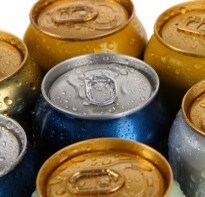'Can' your favourite drink cause you harm? Yes, especially if it comes from a can. A new study in the journal 'Hypertension' says plastic bottles and cans are generally lined with a chemical called Bisphenol A (BPA), the consumption of which has been associated with high blood pressure. Previous studies have linked BPA to heart problems, cancer and developmental problems in children, amongst other things.
Advertisement
For the latest food news, health tips and recipes, like us on Facebook or follow us on Twitter and YouTube.
Advertisement
